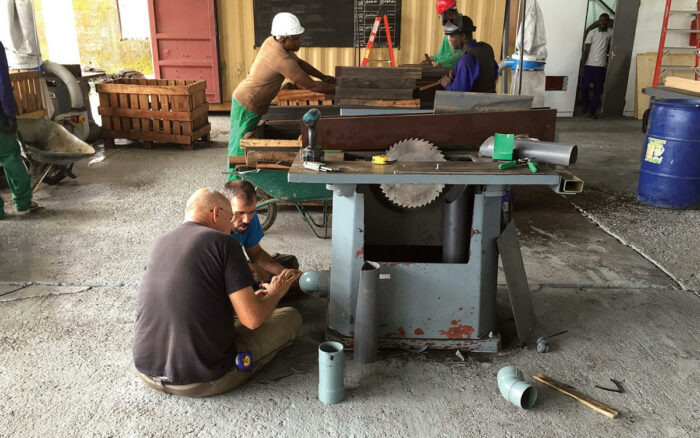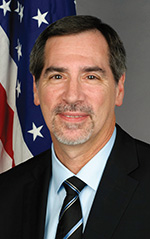
Congo Basin Institute and Ebony Project in Foreign Service Journal
From Guitars to Gold: The Fruits of Economic Diplomacy
In this Foreign Service Journal article, the founder of Taylor Guitars describes the partnership between Taylor Guitars and the Congo Basin Institute "to grow ebony seedlings, and develop a mechanism to make it worthwhile for small farmers to tend the seedlings until they could grow on their own."
This selection of first-person accounts showcases the work members of the Foreign Service do around the world every day to promote U.S. business. This excerpt below is reprinted from the Foreign Service Journal of the American Foreign Service Association.
Often the best diplomatic work leaves no trace because it is achieved behind the scenes, through partnership and shared effort—and an insistence on giving all credit to others. Which is why, when we began planning this special issue six months ago, we put out a call to active-duty and retired members of the Foreign Service, soliciting their best stories about practicing economic diplomacy—“from the smallest success no one outside post would ever hear about, to the biggest, headline-grabbing accomplishment.”
This collection, selected from the many submissions we received, illustrates the critical, everyday work of the U.S. Foreign Service around the world on behalf of the United States in the realm of economic and commercial diplomacy.
Our thanks to all who shared their experiences.
—The Editors
Ebony for Taylor Guitars
by Michael S. Hoza; Cameroon, 2015.

In 2015 Cameroon was an island of relative stability in a very troubled subregion, hosting half a million refugees from conflicts in neighboring states. It was besieged by many of the ills afflicting its neighbors: piracy in the Gulf of Guinea, Boko Haram’s violent extremism in the Lake Chad Basin, waves of infectious disease threatening its population and rapacious neocolonial trade practices by many Chinese companies.
The U.S. government had gained a measure of access and influence with the government of Cameroon through our partnerships to fight piracy, violent extremism and health pandemics. We found dedicated Cameroonian professionals who used our training and equipment to drive piracy out of Cameroonian waters, drive Boko Haram back into Nigeria, eradicate polio and stop outbreaks of bird flu virus and Ebola. The United States was increasingly seen as a reliable partner, and we used that credibility to open the door for American companies hoping to do business in Cameroon, a country that was widely disparaged for its unwelcoming business environment.
Chinese business practices in Cameroon had been ruinous for the country. First, Chinese companies did not create jobs for Cameroonians. They imported their own labor from China, and often left the laborers stranded in Cameroon after the project was completed. Second, China extracted raw materials, but never transferred technology to enable Cameroonians to develop value-added manufacturing. Third, Chinese companies were directly responsible for an overwhelming rate of corruption that was choking the socioeconomic environment. And, finally, Chinese companies did not engage in any form of corporate social responsibility. For more and more Cameroonians, it was increasingly evident that the bloom was off the Chinese investment rose.
Our embassy approached the government of Cameroon with an alternative—American companies and investors. We promoted U.S. companies based on “four points”: they would create jobs for Cameroonians; they would transfer technology to Cameroon; they would adhere to the Foreign Corrupt Practices Act and maintain transparent accounting; and they would engage in corporate social responsibility for the betterment of the Cameroonian people, flora and fauna.
One of our greatest success stories was Taylor Guitars, one of the leading manufacturers of acoustic guitars in America.
As a young man many years ago, Bob Taylor went into his father’s garage and made his first guitar. By 2015 he was selling well over 140,000 guitars a year in the United States alone, and he got all of the ebony that he needed for his guitars from the trees of Cameroon.
Bob Taylor’s vision for ebony production from Cameroon dovetailed with our embassy’s “four points” policy for commercial advocacy. He began by assuming ownership (with Spanish partner Madinter) of the ebony mill, Crelicam. In addition to the 75 Cameroonians directly on Crelicam’s payroll, he worked with banks to establish transparent payment mechanisms for thousands of individual Cameroonian suppliers. Bob walked the talk of creating jobs for Cameroonians—and the jobs he created were good jobs. He brought in state-of-the-art machinery to process the ebony to the exacting specifications demanded by his guitar factory, and trained Crelicam employees to operate and maintain the machines. Bob was often in Cameroon, not in a suit and tie, but in overalls, working alongside his Cameroonian partners.
As much as he enjoyed seeing the Crelicam operation grow in expertise and productivity, Bob was not doing this out of pure altruism. Shipping fine finished pieces of ebony to his guitar factory in the States was a lot less expensive than shipping whole ebony logs. And apart from lowering his production costs, Cameroonians with good jobs represented the beginnings of a middle class that would eventually become consumers of his product.
During one visit Bob was surprised when he entered the office of the local tax assessor, who made it clear that a large bribe was all it would take to give Crelicam and Taylor Guitars a clean tax audit for the year. He walked out of that tax office and straight into my office at the embassy to tell me what had happened.
Thanks to a close working relationship, the embassy soon had an audience with the minister of finance, a young, Western-trained, progressive and highly respected technocrat. By the time the meeting was over, Bob Taylor was promised a fair audit and was notified of his eligibility for a tax holiday for foreign investors who create Cameroonian jobs. While it is unfortunate that we had to go all the way to the ministerial level to get a just outcome, we were grateful for the opportunity to bring Crelicam to the minister’s attention. It was our way of building a healthy business “microclimate” around an American company in what was otherwise acknowledged to be a difficult business environment.
When it came to corporate social responsibility, Bob Taylor proved to be one of the finest examples of American entrepreneurship. He won the Secretary of State’s Award for Corporate Excellence for his responsible harvesting of ebony, but he was not content to stop there. He forged a partnership with the University of California, Los Angeles, and the Congo Basin Institute in Yaoundé to grow ebony seedlings, and developed a mechanism to make it worthwhile for small farmers to tend the seedlings until they could grow on their own. Investing more than half a million dollars of his own money, he got the program off the ground in Cameroon—and can now say that he is planting more ebony than he cuts down. We were so proud of his initiative that we planted two of his seedlings on the embassy compound and one at the ambassador’s residence, amplifying the program through a public diplomacy campaign.
In Cameroon the reaction to the Taylor Guitars initiative was instructive. Pro-American sentiment went up wherever the Crelicam story was told. French commercial logging companies came to us to ask how they could start similar reforestation programs. And the Chinese ambassador thanked me, as the example of Taylor Guitars helped him discipline some of the more wayward companies from his country.
The Minister of Environment of Cameroon signed a private-public partnership agreement with the company at the United Nations Climate Change Conference held in Bonn in 2017 to partner in ebony propagation under the direction of Taylor Guitars and the Congo Basin Institute. And the Cameroonian government sent a trade delegation to the United States to find more American companies like Taylor Guitars.
The Taylor Guitars model served as the kernel around which we built our broader commercial engagement. The reputation for transparency we developed, as well as the new channels of communication we pioneered within the Cameroonian government and the private sector, created openings for other U.S. companies to successfully bid on and receive contracts and other opportunities.

Michael S. Hoza entered the Foreign Service as a management-coned officer in 1985. He has served in 11 overseas postings, including as U.S. ambassador to Cameroon from 2014 to 2017.